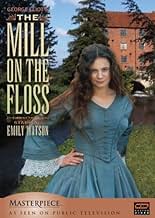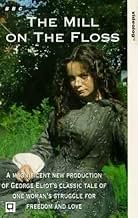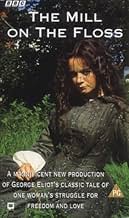Aggiungi una trama nella tua linguaLawyer Wakem takes away the mill on the river Floss from Edward Tulliver, whose ancestors owned it for three hundred years, and becomes the worst enemy of Tulliver's family. When Edward's da... Leggi tuttoLawyer Wakem takes away the mill on the river Floss from Edward Tulliver, whose ancestors owned it for three hundred years, and becomes the worst enemy of Tulliver's family. When Edward's daughter, Maggie, grows up, she falls in love with Wakem's son Philip, but her brother Tom, ... Leggi tuttoLawyer Wakem takes away the mill on the river Floss from Edward Tulliver, whose ancestors owned it for three hundred years, and becomes the worst enemy of Tulliver's family. When Edward's daughter, Maggie, grows up, she falls in love with Wakem's son Philip, but her brother Tom, true to the memory of their father, forbids her to meet him again. When she visits her cou... Leggi tutto
- Regia
- Sceneggiatura
- Star
- Nominato ai 2 BAFTA Award
- 2 candidature totali
- Stephen Guest
- (as James Weber-Brown)
Recensioni in evidenza
Elliot was born in 1819, 2 years after Austen's masterpiece was published. I think it is safe to assume Elliot was very familiar with her compatriot's novels, probably having read them as a young girl. The characters in Elliot's story are not very much different in their social behavior and speech than were Austen's 43 years before. Mid-Victorian England was slow to shed the Georgian habits, though Elliot's people are more open and expressive of their emotions and inner turmoil. But the same sense of honor and "conscience" rules the behavior of both Elliot's and Austen's heroines.
Maggie Tulliver (Elliot) and Anne Elliot (Austen) have much in common. They are both highly intelligent, sensitive and loving women, under the yoke of the men in their lives. They both make terrible sacrifices for the men in their families. Both of them have fathers who are implacable, though highly different in their natures; Anne Elliot's being a useless fop and Maggie Tulliver's a bull-headed, good-hearted man. Both men are at the mercy of their prides.
But this is where the two stories diverge. Elliot's love story veers down the road to tragedy with the introduction of Stephen Guest, a man engaged to Maggie's cousin and subsequently falls hopelessly in love with Maggie. Anne Elliot, in Austen's story, is also besieged by a second man but he turns out to be a cad and she is aided by a deux-ex- machine in the person of her old school friend, Mrs Smith, who sets her wise to the duplicity of her Cousin, another Elliot, who is machinating to marry Anne for her money.
Maggie has no such luck in George Elliot's world. Perhaps this is indicative of the looming tragedy engendered by the growing complexity of human life during the industrial revolution, a shift in culture that brought tragedy to many people, especially in the rural parts of England, driving them from their agrarian lives they'd lived for centuries into the cities to be slaves for the new world of steam and iron. Sensitive souls often did not survive this transition and Maggie Tulliver and her brother, who tries to adapt, fall prey to the growing pressures of "keeping up."
'The Mill on the Floss' seems a natural extension of 'Persuasion' and would make a very nice double bill at home on some cold, winter's night. I can't help but wonder if Mary Ann Evans changed her name to George Elliot out of homage to Jane Austen.
Films of great literature inevitably have to omit a great deal, unless the BBC takes it on and does a multi-evening production, as they did with some of Dickens' novels, to great effect, notably 'Bleak House'.
But this adaption of 'The Mill on the Floss' was limited to 2 hours or so and cuts must obviously have been made. I haven't read the book but there seemed to be points in the film that left me thinking that I'd just jumped over a hole in the ground and I was viewing a cinematic Cliff Notes version of Elliot's mind-numbing tragedy.
Having said all that, I enjoyed this film. Mostly I think I liked it because I love Emily Watson. She is a super-charged Maggie Tulliver and carries the weight of her fateful tragedy with a steadfast resolve. Watson has a deep reservoire of feelings and brain- power from which to draw for her characters. Maggie Tolliver was an early part for her in her ever-burgeoning brilliant career. Already at this early stage she shows exceptional talent. And she's very beautiful into the bargain.
The supporting cast is excellent, especially Cheryl Campbell and Bernard Hill as her parents.
The photography is beautiful and the settings totally convincing. There is nothing precious about this 19th century classic and this allows the story to speak to modern viewers without seeming to be set in aspic.
Maggie's struggle with her conscience and love are heart-wrenching and her fate seems particularly horrible, with salvation seeming to be so close at hand.
If you are an admirer of Emily Watson I highly recommend this film, otherwise I'm not so sure that the slow pace and meditative atmosphere of Maggie's dilemma will hold the attention of those that are not interested in 19th century England. But I'd encourge anyone who is curious to seek this version of 'The Mill on the Floss' out. If you loved Roger Michell's recent version of 'Persuasion' I think you will like this film very much.
Not all the performances work, Ifan Meredith is rather dull and wooden as Tom which makes his and Watson's chemistry not as convincing as it should(the 1978 adaptation does it much better). Stephen Guest's annoying traits- that he's shallow and conceited- are amplified to extremities in James Weber Brown's performance that if you were there in person you wouldn't stand to be in the same room as him. The satirical characters are so bland that they're practically out of sight as well. The pacing and that there is little meat to the story and characterisations are the biggest problems. The adaptation is too short in the first place, which immediately does dilute the emotion and complexity, but it also manages to be both rushed and dull. Dull because whereas Eliot's writing is of the flesh and blood kind it is reduced to in some parts one-dimensional stereotyping(especially Stephen) and Maggie and Tom and their relationship are present but with no real substance. And rushed because the details are all there but a lot of it feels very jumpy and skimmed over that there is often not enough emotional connection. Situations happen but too often it is so skimming-the-surface quality that they are just there for the sake of being there with no proper reason or reflection. The scripting has moments where it provokes thought and shows evidence of Eliot's style but it is at the same time too cultivated and could have done with more flow. Overall, has good things but also things that could have been done better, with a longer length it would have been more engaging and powerful I feel. 6/10 Bethany Cox
I kind of liked the film but I see why other people don't; it's flawed: the movie depicts the close sibling relationship but, the actors who played the siblings didn't have much familial chemistry with each other (the actor who played Tom was particularly dull) so their scenes felt flat and pointless.
Stephen and Lucy felt a bit generic as well. James Frain was wonderful and deep as Phillip but, so much so that he stuck out and it felt like he should've been a character in a different (and better) movie. As I mentioned, I "sort of" liked the movie but, it was very flawed.
Lo sapevi?
- ConnessioniFeatured in Masterpiece: The Mill on the Floss (1997)
I più visti
Dettagli
- Data di uscita
- Paesi di origine
- Lingua
- Celebre anche come
- Mlyn nad Flossa
- Luoghi delle riprese
- Aziende produttrici
- Vedi altri crediti dell’azienda su IMDbPro
































